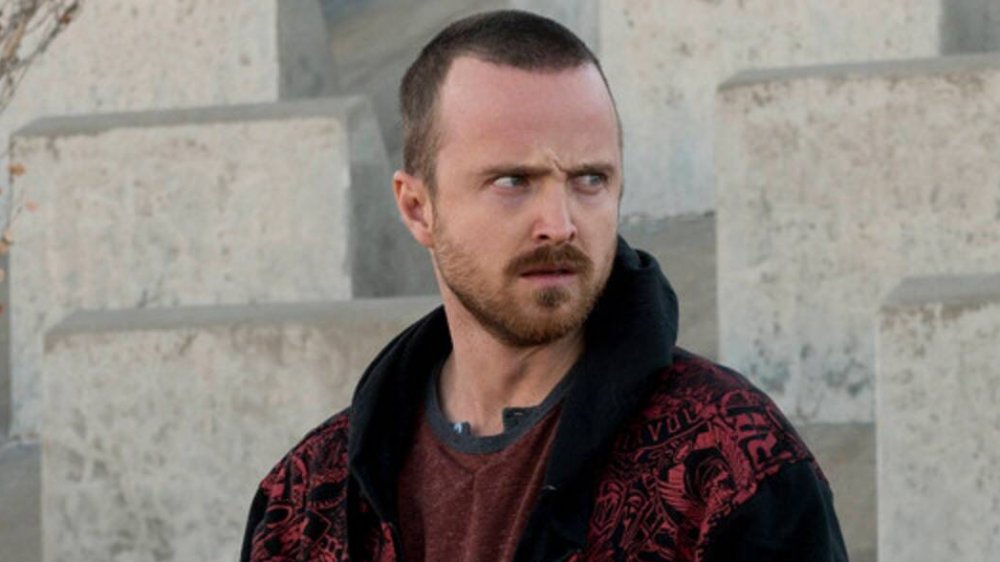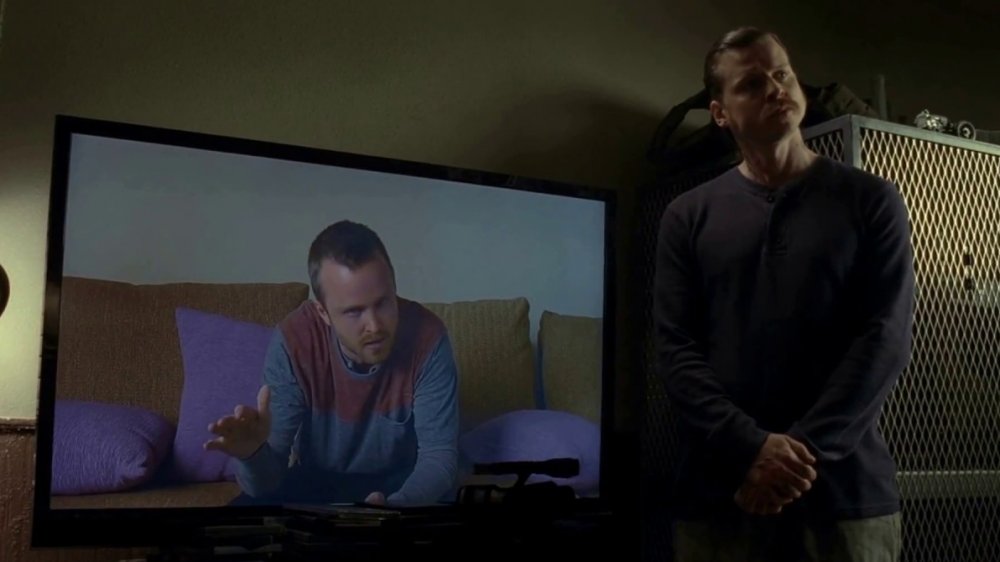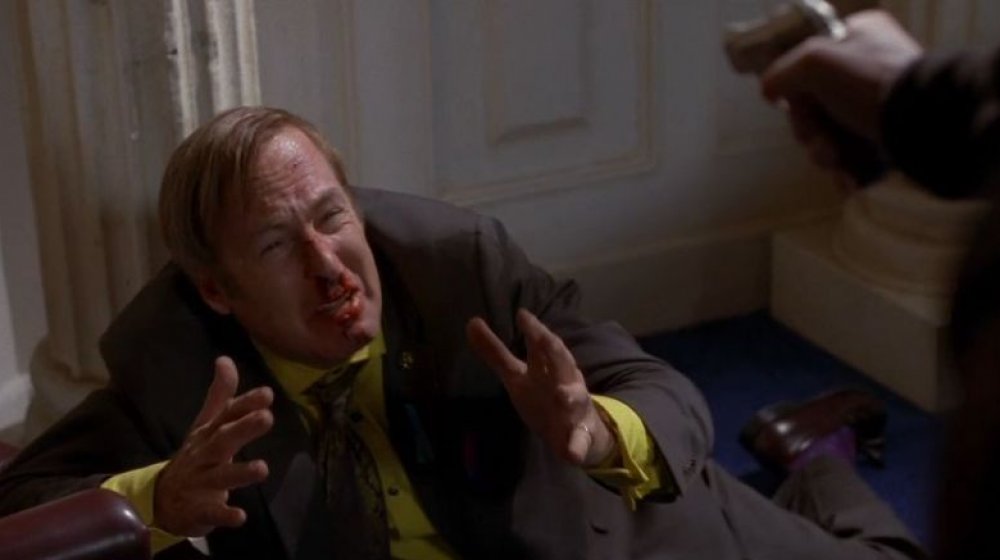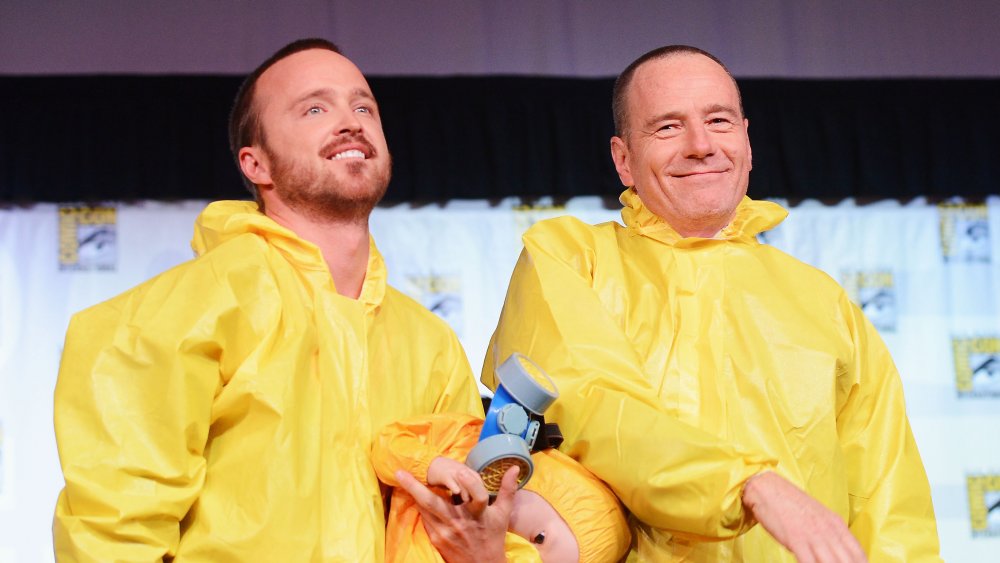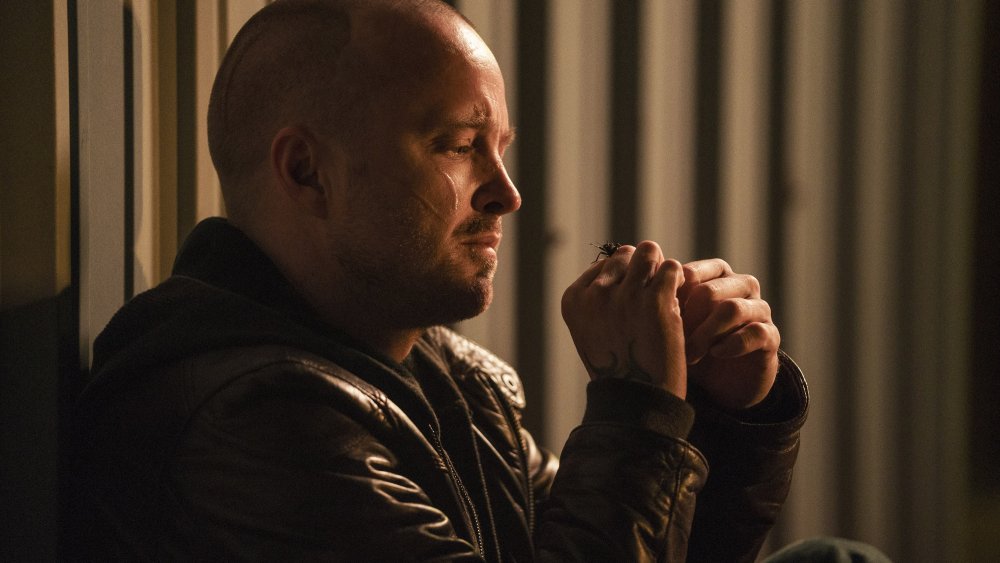The Jesse Plot Detail From Breaking Bad That Still Bothers Fans
This article contains spoilers for the ending of Breaking Bad.
Breaking Bad is regarded as one of the finest TV shows of recent years, perhaps of all time. The rise and fall of Walter White (Bryan Cranston) from cancer-ridden chemistry teacher to bullet-ridden meth kingpin constitutes an epic, almost classical tragedy. Creator Vince Gilligan and company drafted a tense, densely interwoven plot over five seasons that managed to surprise and satisfy at every turn.
Since Breaking Bad finished in 2013, it's spawned the lauded spin-off Better Call Saul, a follow-up movie chronicling what happened to Jesse Pinkman (Aaron Paul) after the series finale, and an endless supply of memes, nostalgic debates, Heisenberg merchandise, and people growling imitations of Cranston's pitch-perfect vocal fry.
Few people disagree with the show's greatness, but even such a well-crafted series is bound to leave some plot points unresolved, or write itself into a corner now and then. That's where the season 5 episode "Confessions" comes in. This episode contains a major turn of events for Walter, based on a very conveniently-placed epiphany of Jesse's. Even now, years after Breaking Bad left the air, the impact of the show can be felt in ongoing online discussions.
Let's take a look at the episode in question to see what the fuss is about.
Stealing the ricin cigarette
As a standalone episode, "Confessions" more than lives up to its name. It starts with thug-for-hire Todd (Jesse Plemons) in a diner bragging to two Nazis about the infamous train heist that went down in the episode "Dead Freight," and continues with Walter's DEA brother-in-law Hank (Dean Norris) trying to get a confession from Jesse about Walter's drug empire. Saul Goodman (Bob Odenkirk) interrupts and takes Jesse to Walter, who convinces Jesse to escape to another city and take on a new identity. Meanwhile, Hank and Marie meet Skyler (Anna Gunn) in a Mexican restaurant and get on the topic of Walter's confession. Walter gives Hank and Marie a DVD with a fake confession framing Hank for his own drug dealings. There's even a bit where Walter confesses about his cancer to his son, Walt Jr. (R.J. Mitte).
All in all, it looks like Walter is wrapping up enough loose ends to stay safe. That's when Jesse, waiting for a van to pick him up and carry him to a new life, rifles through his pockets and spirals into a whirlpool of realizations. Jesse is at first in search of a small cache of marijuana — the same that Saul attempted to take from Jesse in his office — and discovers that it's missing. Instead, Jesse's fingers float across a packet of cigarettes. It's in this moment he has a realization: He didn't lose his marijuana — Saul's bodyguard Huell (Lavell Crawford) took it off him without him noticing ... exactly like he had previously stolen the pack of cigarettes containing the poisonous ricin cigarette intended to kill drug lord Gustavo Fring (Giancarlo Esposito). Walt lied to Jesse about what happened to the ricin, and when Jesse realizes what's actually happened, he reaches a tipping point where he's had enough of Walt's lies.
Ricin ex machina
This somewhat convoluted set of circumstances involving ricin and cigarettes has been discussed again and again over the years. At the time that "Confessions" aired, Jesse's sudden epiphany caused a lot of confusion among fans, who themselves had lost track of the ricin plot thread. In fact, the ricin narrative goes all the way back to season 2, during which Walter makes a batch to kill the crazed Salamanca drug distributor Tuco (Raymond Cruz). It also connects to another plot from season 4, with Walter making an another batch of ricin to convert into cigarettes. There's an additional plot thread involved the young boy Brock Cantillo (Ian Posada), son of Jesse's love interest Andrea (Emily Rios), whom Walter poisons in order to dissuade Jesse from leaving his drug empire.
On "Confessions," Jesse comes to the conclusion that Walter used a ricin cigarette to poison Brock. He's wrong about the method of poison — Walter actually used poisonous berries from the Lily of the Valley plant — but he's right about the fact itself.
It's understandable to see how fans were not only confused about all these minor plot points spanning several seasons, but also about how Jesse managed to piece together a chain of events in the final few seconds while waiting on the side of the road. Even for Breaking Bad, this development veers into deus ex machina territory, with an event magically happening for the sake of the plot. The ricin cigarette itself could easily feel like a forced MacGuffin: a gear of the narrative very obviously wedged into place to push events in a certain direction.
Deep down, Jesse always knew
One very obvious explanation for this still-bothersome plot point is that Jesse always knew. Jesse knows better than anyone about Walt's potential for cruelty and treachery because he's been side-by-side with him in the meth ring since day one. Through the entire series, Jesse calls out Walt for lying to him and toying with him. It's not a stretch for Jesse to conclude that Walt had something to do with Brock's poisoning.
Unconsciously, then, Jesse waited until the last possible second, with the relocation van in front of him, to force himself to make a decision. If this is the case (it's not explicit), such a choice is very deliberate part on the part of the show's writers to give Jesse the opportunity to resolve his character arc. As a pawn of Walt's, Jesse had always struggled with personal agency. Finally, during "Confessions," he turns his fate around, and goes from a passive participant in his own life to an active one.
Or, as some complain, the whole "Jesse's convenient instant realization about the ricin cigarette" is a leftover, niggling plot point that represents a moment of incompetence on the part of the writing. A bit of deus ex machina that drags Walt — and the series — to a predetermined endpoint.
Regardless of the truth behind the events of "Confessions," it's not likely that Breaking Bad's legendary reputation will be tarnished anytime soon.
The trauma Jesse indirectly caused Brock on Breaking Bad weighed on him heavily
Jesse often thought about Brock's poisoning, and how his relationship with Walt put Brock and Andrea into grave danger. Brock nearly died, and at the end of the show, Andrea was murdered as a way to send Jesse a message after he attempted to flee from Todd Alquist (Jesse Plemons) and his dangerous family. If Jesse had never gotten mixed up with Walt, Brock never would have been poisoned. If he hadn't partnered with Walt in the meth-making biz, Jesse also wouldn't have met Todd, who began working as Walt's assistant on later seasons of Breaking Bad, and then Andrea wouldn't have been killed. Similarly, if Jesse hadn't struck up a romantic relationship with Andrea, she wouldn't have been exposed to his criminality and the bad guys around him; Andrea would be alive and Brock wouldn't have been harmed.
Jesse isn't directly responsible for Brock's poisoning or for Andrea's murder — he didn't commit either act himself — but he feels guilty all the same. At the end of the 2019 Netflix film El Camino: A Breaking Bad Movie, a feature-length spin-off that follows Jesse after his successful escape on the Breaking Bad series finale, Jesse heads to Alaska to begin a new life. Just before he leaves, he hands to Ed Galbraith (Robert Forster) a goodbye letter ... written to Brock. The ending of El Camino was originally meant to feature a voiceover of Jesse reading the note for Brock, but viewers never got to hear that or see what was inside the envelope.
Jesse Pinkman actor Aaron Paul told TV Guide that Jesse's letter to Brock was quite emotional, and that he hopes fans can hear it some day. "[It's] the most honest, beautiful, caring letter imaginable — really, just pouring his heart out and saying he's sorry," said Paul. "I hope one day that people are able to hear what's in that letter. I'm begging Vince to allow me to release it, but we'll see if that happens."
